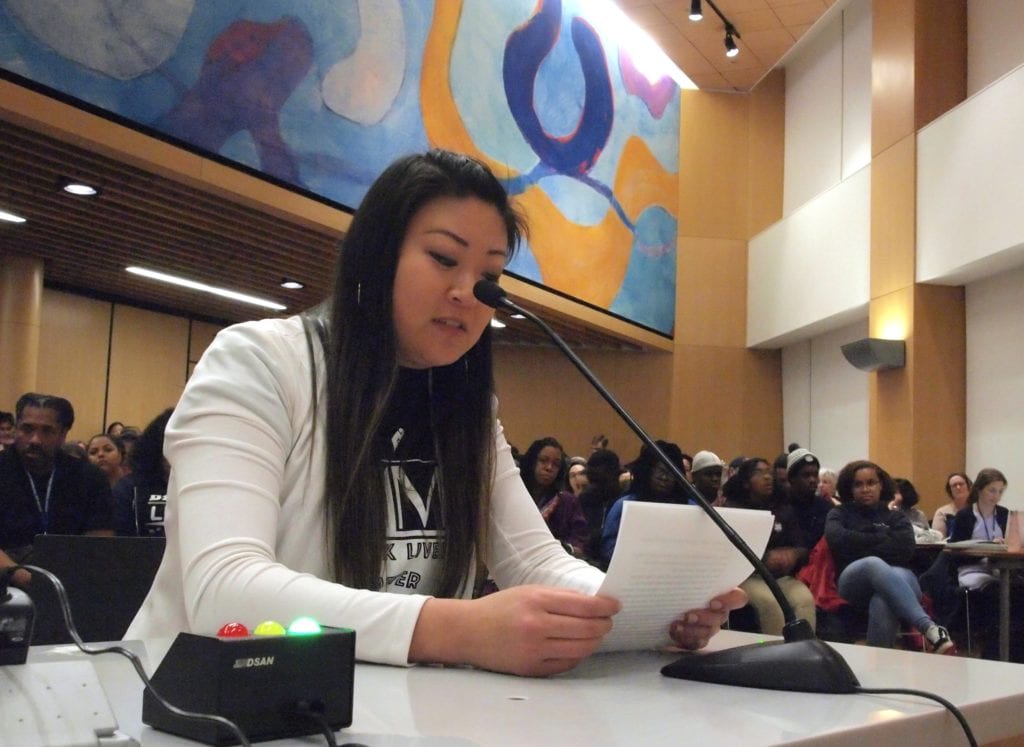Boston teacher’s Black Lives Matter initiative draws fire from police union
Black officers, NAACP rebuke Patrolmen's Union, support teachers

A police union official had angry words for the Boston Teachers Union’s third annual week-long Black Lives Matter observance, firing off a broadside at BTU President Jessica Tang.
In his letter to Tang, Boston Police Patrolmen’s Union President Michael Leary said the activities of the national Black Lives Matter Movement, which formed in response to police shootings of unarmed blacks, “have the effect of making my members less safe.”
“Policing has always been a dangerous profession, but groups like Black Lives Matter, by inaccurately demonizing police as racists who kill innocent people, have made policing more dangerous than ever before,” Leary wrote in the letter, dated Monday, Feb. 3.
Leary’s letter drew a sharp rebuke from the NAACP Boston Branch and the Massachusetts Association of Minority Law Enforcement Officials, who issued a joint letter Wednesday.
“There are many police officers who understand the ideals and values behind BLM and align themselves with BLM and other social justice organizations,” the letter reads. “We do not believe BLM is synonymous with ‘anti-police.’ In fact, we believe that BLM is a reflection of the historical mistreatment of black and brown people in this country, not only by law enforcement but also by a culture that has quietly undermined the value of the lives of black and brown people.”
The joint letter acknowledged that some MAMLEO members took exception to the BTU demand to “fund counselors, not cops.”
Tang and others, however, testified at the School Committee meeting Wednesday in favor of increasing funding for mental health counselors in the schools rather than having police officers intervene in school-related discipline issues.
“We believe counselors need to be a higher funding priority over theoretically increasing the number of police in schools,” Tang told School Committee members. “With limited budgets and cuts we believe adequate access to social-emotional well-being, restorative practices and other efforts are more effective than increasing police presence in our schools.”
Tang joined dozens of teachers and students from BPS schools at the School Committee meeting who wore Black Lives Matter tee-shirts. While not affiliated with the national Black Lives Matter movement, the local effort is part of a national movement of teachers advocating against policies they say harm black children. The movement started in Seattle four years ago. This year is the third in which Boston teachers have taken part in the observance.
During the School Committee meeting, Tang and others framed the Black Lives Matter observance in the context of their demands for more resources for BPS students.
“Although it’s important to celebrate black history every month, the month of February is an opportunity to elevate and highlight the work that we’re doing in this district when it comes to affirming black lives and nurturing black futures in the Boston Public Schools,” Tang said. “And, of course, a baseline budget is a part of that.”
Teachers testified in favor of adding ethnic studies into the BPS curriculum; ending zero tolerance policies that they said disproportionately target black children for out-of-school suspensions; and ending the department’s practice of sharing student information with Boston Police Department officials, who between 2014 and 2017 made accessible to federal immigration officials information on more than 100 students, resulting in at least one deportation.
“There are undocumented students in our communities whose safety is at risk,” said Boston Latin Academy student Khymani James.
Tang spoke in support of BPS hiring more teachers of color, noting that the district is still under a court order to diversify its majority-white teaching staff.
“We have a court mandate,” she said. “We need to reach that goal.”
Speaking outside the School Committee meeting room, Joel Richards, who teaches technology at Blackstone Elementary School, told the Banner he felt compelled to participate in the BTU initiative.
“Silence isn’t an option for black people or people of color,” he said.
Richards recalled an incident a few years back when he taught at Mattahunt Elementary School. Leaving the school one day dressed in a shirt and tie, he was stopped by an officer who asked for his ID and questioned him.
Upset, Richards said, he asked the officer how he would feel if he were accosted while leaving work.
“He just said, ‘Well, I didn’t put you on the ground.’”








